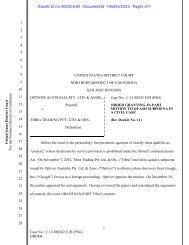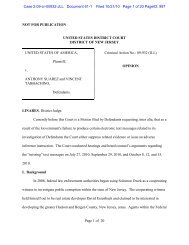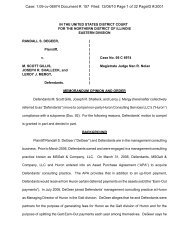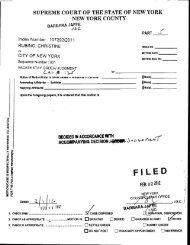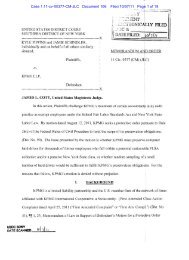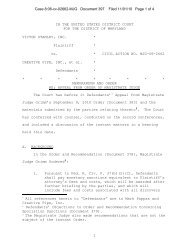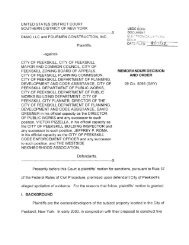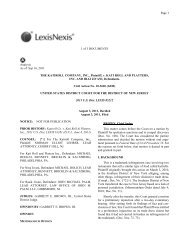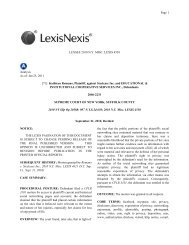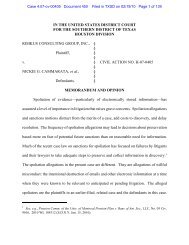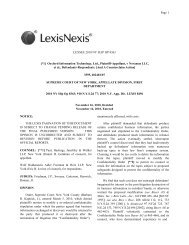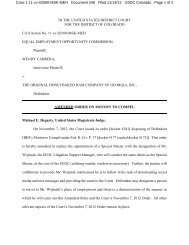SANCTIONS FOR E-DISCOVERY VIOLATIONS: BY THE NUMBERS
SANCTIONS FOR E-DISCOVERY VIOLATIONS: BY THE NUMBERS
SANCTIONS FOR E-DISCOVERY VIOLATIONS: BY THE NUMBERS
You also want an ePaper? Increase the reach of your titles
YUMPU automatically turns print PDFs into web optimized ePapers that Google loves.
824 DUKE LAW JOURNAL [Vol. 60:789<br />
VI. RULE 37(E)’S SAFE HARBOR PROVIDES LIMITED PROTECTION<br />
Rule 37(e), adopted on December 1, 2006, contains a safe harbor<br />
for certain conduct relating to the preservation and production of<br />
ESI. The Rule provides: “Absent exceptional circumstances, a court<br />
may not impose sanctions under these rules on a party for failing to<br />
provide electronically stored information lost as a result of the<br />
routine, good-faith operation of an electronic information system.” 151<br />
The drafters intended the rule to provide only “limited<br />
protection against sanctions.” 152<br />
Its purpose was to protect against<br />
sanctions arising solely from the loss of ESI through the routine<br />
operation of electronic systems that automatically discard<br />
information. 153 The rule was never intended to provide protection for<br />
all manner of missteps in the broad range of e-discovery activities<br />
performed by parties and their counsel—such as failure to search and<br />
failure to produce on schedule.<br />
Despite its limited scope, the proposed rule generated<br />
controversy concerning the appropriate standard of culpability that<br />
would support or preclude sanctions. 154 Proposed standards included<br />
151. FED. R. CIV. P. 37(e). When adopted, the safe harbor provision was contained in Rule<br />
37(f). The 2007 edition of the Federal Rules moved the safe harbor provision from Rule 37(f) to<br />
Rule 37(e) with no changes to the rule’s text. Compare id., with FED. R. CIV. P. 37(f) (2006).<br />
152. ADVISORY COMM. ON <strong>THE</strong> FEDERAL RULES OF CIVIL PROCEDURE, REPORT OF <strong>THE</strong><br />
CIVIL RULES ADVISORY COMMITTEE 83 (May 27, 2005), available at http://www.uscourts.gov/<br />
uscourts/RulesAndPolicies/rules/Reports/CV5-2005.pdf. The Committee noted that the<br />
proposed new rule would afford “limited protection against sanctions” for the loss of<br />
information as a result of the routine operation of an electronic information system. The<br />
Committee recognized (1) that automated features in many electronic systems “automatically<br />
create, discard, or update information without specific direction from, or awareness of” system<br />
users; (2) that “such automatic features are essential to the operation of electronic information<br />
systems”; and (3) that “suspending or interrupting these features can be prohibitively expensive<br />
and burdensome.” Id. The Committee noted that electronic information systems present issues<br />
for businesses that are absent from traditional, paper-based systems and that efforts to suspend<br />
automatic electronic processes risk disrupting business operations: “[i]t is unrealistic to expect<br />
parties to stop such routine operation of their computer systems as soon as they anticipate<br />
litigation.” Id.<br />
153. Id. at 83.<br />
154. See id. at 83–90 (discussing the proposed rule and the public commentary surrounding<br />
it). The first draft of the proposed rule published by the Advisory Committee “barred sanctions<br />
only if the party who lost electronically stored information took reasonable steps to preserve the<br />
information after it knew or should have known the information was discoverable in the<br />
action.” Id. at 88. The Advisory Committee noted that this proposed version adopted a<br />
negligence standard, and the Committee also invited comment on whether the rule should<br />
instead set forth a standard of conduct which would bar sanctions unless the party “recklessly or<br />
intentionally failed to preserve the information.” Id.



